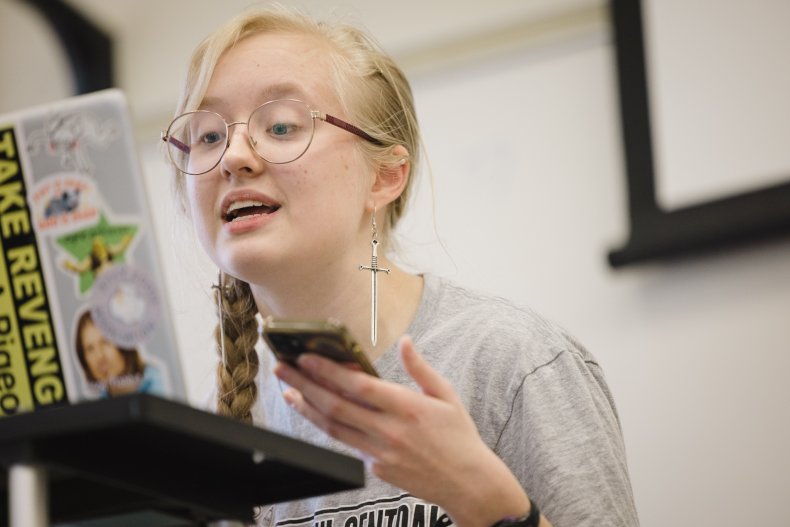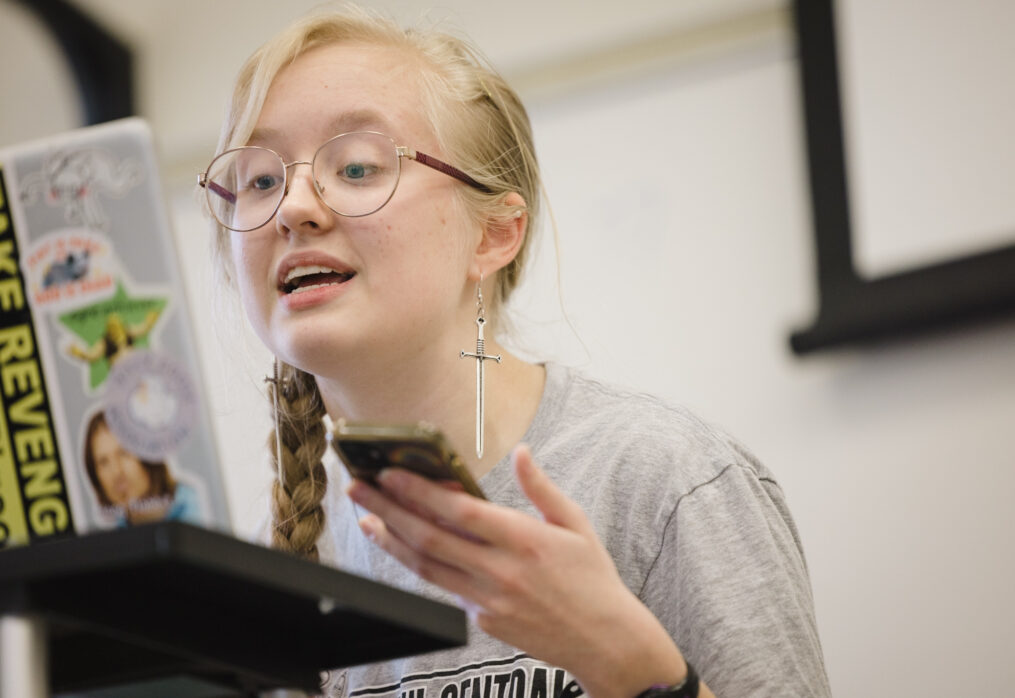St. Paul Central High School Debaters Celebrate Unexpected Tournament Run
At the 2022-2023 Urban Debate National Championship in Dallas, Maren Lien and Cayden Mayer of St. Paul Central High School were shocked and grateful to make it to the finals. Even though they lost the last match to two juniors from Port of Los Angeles High School, the Minnesota seniors said they would not have done anything differently.
The pair met in the third grade but became debate partners three years ago, just before the COVID-19 pandemic hit. From that day on, the two became each other’s emotional support in and out of debate.
Lien and Mayer have developed a strong kritik style of debate that employs a more philosophical and theoretical approach that goes beyond the policy perspective to analyze systems of power, including the structure of debate itself. Last year, they made it to the semifinal round of the Urban Debate National Championship and were one of the top teams to beat last weekend.
For most of this season, Lien and Mayer were more focused on coaching younger debaters on their team and a middle school debate team than on competition. In Dallas last weekend, they wanted to enjoy their final tournament together and meet debaters from across the country in person after years of online debate.
Inclement weather conditions forced the National Association for Urban Debate Leagues (NAUDL) Championship Tournament final round to be delayed a few days. It was conducted over Zoom and live-streamed Wednesday night.
In an interview with Newsweek, Lien and Mayer talked about their strategy and mindset going into their final tournament together, as well as their close partnership and the impact debate has had on each of them.
What are your reactions to making it to the finals?
Mayer: Going into this [tournament], competition was definitely second priority for us. The community aspect is what we were trying to focus on. And so it was definitely unexpected to get to this point.
Lien: I think it was a very different atmosphere to do this over Zoom and digitally. And so it was a different mindset that we were approaching this specific round with than any others we were doing in person.
Mayer: We were getting texts from people, like before the round started, showing the community love and stuff, even from people who live in, like, the Los Angeles area that we know from camp.
Lien: It also just reinforced that this is more than just the people in this round. This is more than just the ballots and the speeches that were made.

TAYLOR GLASCOCK/NAUDL
What was it like to debate one last time with your partner?
Mayer: All of my real debate experience functionally has been with the wonderful Maren here…and I think that our ability to be able to have the mindset shift that we had going into this tournament versus last year’s tournament also attests to the support and the beautiful community that we’ve been surrounded by.
Lien: We do so much together, debate-wise, that we’re just so in step even when we’re not. So going into this round, I think just it was definitely a little bit sad, like this is the last time I get to debate with Cayden. But then right before the round, I was just like, “I get to debate with Cayden again!”
Either way the round went, I think we went through it together. And there was no point in the round where I was just like, “Oh, they messed up,” or like, “I messed up and I’m ruining this partnership.” We are a team and when we go down, we go down together.
How did your strategy or mindset change between the semis on Sunday and the final round on Wednesday?
Mayer: When we won the semifinals, we were very ecstatic to have made it further than what we did the previous time, and I think that we were putting in more competitive prep for this round, and we did for, like, the whole tournament.
Lien: Last night, we had a call that was a few hours about where we were going into today because we really had to be reactionary to whatever the affirmative brought, which puts us in a tight situation.
We’re proud of our partnership. We’re proud of the success.
Beyond this tournament, what impact has debate had on your life?
Lien: [Debate] really opened a lot of doors for me in terms of what I’m learning, what kind of concepts I’m engaging with, just a lot of things that I don’t learn about during my normal school days. It’s a lot of new ideas that I would not have been introduced to otherwise, which I think has really impacted how I engage with classes in school.
The other thing is it has helped me grow as someone who is more confident in their leadership and presentation skills.
Mayer: As a student, it definitely makes school significantly easier. Because when you’re like, “Oh my gosh, this is only a 500-word essay—that’s crazy. I wrote, like, a 1,000-word rebuttal last weekend,” it makes everything seem a lot easier in comparison.
I think that it also made me more confident in advocating for myself and understanding how to come across as both confident and assured without, you know, being a bit of an a****** to people. Also, I came from kind of a transphobic middle school. So the debate team in high school was the first time that I saw other nonbinary and trans folks that were really accepting and cool.
What are some of the major challenges you face in debate?
Lien: I think the more personal challenge is I struggle a lot with getting myself to do individual work, like research work. Like to go out and research different policies because usually it takes an assignment in a class for me to do that. It’s helped me build research skills because I have to know what [I’m] talking about.
Mayer: Balance. It’s easy to get really sucked into it for like a month and then get crazy burnt out and then go back and do it all over again. And that’s not a healthy cycle. And so I think [you have to] dedicate time to debate to become better, because that’s how you do—it is just with time and practice, but at the same time, like, don’t burn yourself out. Because not only is it bad for you, but it’s bad for your competitive abilities.
Do you plan to stick with debate after high school?
Lien: For the last two years, I’ve been coaching middle schoolers. I think I’ve come to the conclusion that I definitely am going to continue with that—I actually just committed to school in the Twin Cities. But I still want to support the [Minnesota Urban Debate League]. I think the league definitely runs on the graduates and the people who just come back and show their support and their love and their passion for it. I want to give back in that way, especially because of how much help I’ve had.
Mayer: I am not going to continue competing debate—I’m like 95 percent sure on that statement. Hopefully, I’ll be involved in coaching in some shape, not entirely sure how yet. And then I’ll be at the University of Minnesota, so I have the opportunity to continue debating if I want.
I really love, specifically with debate coaching, watching students become more confident in their arguments and then watching how that improves their confidence outside of the debate round….And I want to be an English teacher one day, so I feel like [coaching] is down my alley a little bit.
